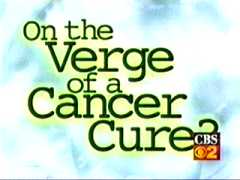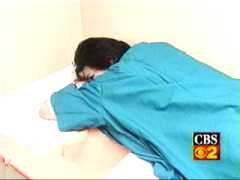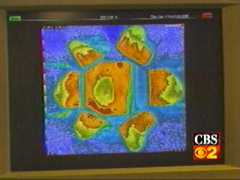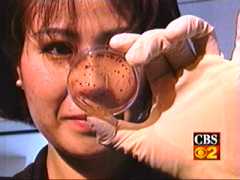 |
 |
 |
 |
| |
||||
On The Verge Of A Cancer Cure? Part IVPrevention And Detection  We are a cancer-conscious society. We are a cancer-conscious society. The messages are familiar: Fry now, pay later. Smoking is prohibited. Science is racing to stay one step ahead of this deadly and mysterious disease. CBS 2 News' Gretchen Carr takes us into the world of medicine to find out what's being done to win the battle against cancer. Special Assignment: On The Verge Of A Cancer Cure? Part IV aired Wednesday, April 22, 1998 at 11 p.m. Part I aired Sunday, April 19, 1998, Part II aired Monday, April 20, 1998 and Part III aired Tuesday, April 21, 1998 But Estrada's testing went beyond tradition because she participated in the new study of thermal breast imaging, reported CBS 2 News' Gretchen Carr. A thermal breast-imaging test requires the patient to lie on a pad. A machine then shoots cold air into the patient's breasts. High-tech heat-seeking sensors measure the rate at which the breast regains its normal temperature. The theory is that malignant tumors stay warmer longer. A benign mass would cool faster, said Carr. "This is a diagnostic tool," Dr. William Dougherty at USC Norris Cancer Center told CBS 2 News. "It's primarily to identify those women that have a cancerous tumor from a benign tumor." "Women that are going to have a biopsy, that have been worked up by their physician, and they've decided that they want to go for a biopsy," Dougherty said. "All those women would be able to be our candidate." Dr. Jeffrey Weitzel at the City of Hope Cancer Center and Dr. Darcy Spicer at USC Norris Cancer Center are part of a research team testing a nasal spray to prevent breast cancer and make mammograms easier to read. "The goal is to decrease breast density and to make the connection to actual cancer prevention," Weitzel told CBS 2 News. "It's very clear that women who have higher density in their breasts have an increased risk for breast cancer." Spicer and Weitzel are looking for women at high risk for breast cancer to participate in the study. In Southern California, we face a greater cancer risk than residents in some other parts of the country, said Carr. Doctors say exposure to the sun is the leading cause of melanoma, a cancer that attacks the body's pigment cells. "They said I had a large tumor in my right eye and they called it a carroidal melanoma and that it was malignant," Carrillo told CBS 2 News. Later the melanoma came back in her liver. Traditional surgery and chemotherapy put her in remission, which made her a perfect candidate for an experimental and preventive melanoma vaccine. "This is essentially an attempt to secondarily prevent the disease," Dr. Jeffrey Weber at USC Norris Cancer Center told CBS 2 News. "They've had the disease and they're at risk for relapse." The vaccine trials target patients who have already had melanoma and who, like Carrillo, are now disease free. Weber says a melanoma left untreated is one of the fastest moving cancers. On your own skin, watch for any blemish that turns black or has jagged edges. If you have a sore that bleeds or doesn't seem to heal, get it checked. Weber says melanoma can be successfully treated if it's detected early. Doctors tell us that scientists around the world believe the secret to curing all forms of cancer lies in the delicate scaffolding of DNA, said Carr. The brave new frontier in cancer treatment is to avoid having to give patients any of the above treatments simply by preventing the cancer altogether. Contact information:
On the Web:
|
|
 |
|

 |
||
|
12 p.m.
Woman 2 Woman One of the stars from "Judging Amy" 5 p.m. 6 p.m. 11 p.m.
|
||
 |
||
|
4-5 p.m.
Judge Judy Ruler Of The Free World! 8:00 p.m. 8:30 p.m.
9:00 p.m.
|
||
| |
||
 Like thousands of other women who find lumps in their breasts, Maria Estrada went through the traditional medical test -- a surgical biopsy to remove the mass and test it for cancer.
Like thousands of other women who find lumps in their breasts, Maria Estrada went through the traditional medical test -- a surgical biopsy to remove the mass and test it for cancer.  So, which women are eligible to become candidates for this test?
So, which women are eligible to become candidates for this test?  Melanoma first attacked Becky Carrillo in the pigment of her eye.
Melanoma first attacked Becky Carrillo in the pigment of her eye.  "No sign of disease," Carrillo said. "I had a good immune response to the vaccine and I'm alive and well."
"No sign of disease," Carrillo said. "I had a good immune response to the vaccine and I'm alive and well." 

